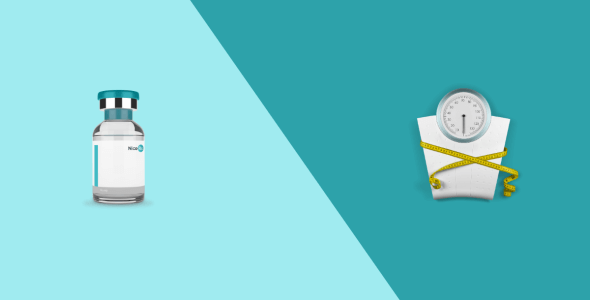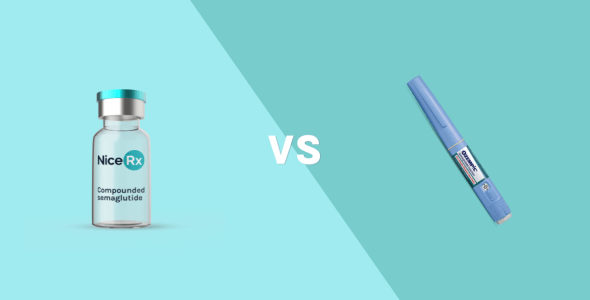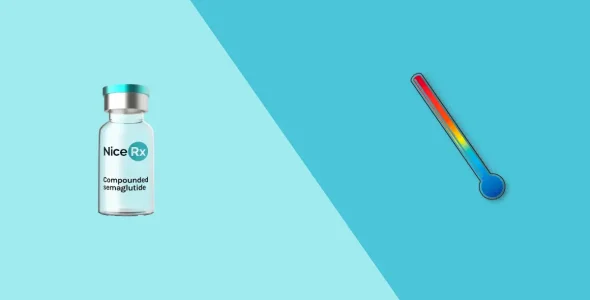How long does it take for semaglutide to suppress appetite?
Key highlights
- You may notice appetite suppression within 1-4 weeks and weight loss may start to be visible after 4-8 weeks.
- It's more likely to notice a more noticeable reduction in appetite around 8-12 weeks after starting the medication as the dosage is increased.
- The full appetite-suppressing effects are typically realized after reaching the maintenance dose.
- For the best weight loss outcomes, semaglutide should be used alongside a nutrient-rich, balanced diet and regular exercise.
Have you started semaglutide and are wondering when your hunger cravings will go away? While it can vary by person, some people may start noticing a decrease in appetite within the first few weeks of starting semaglutide, and for many more people, a more noticeable reduction in appetite occurs around 8 to 12 weeks after starting the medication as the dosage is increased. Blood sugar levels drop within hours of taking semaglutide, whereas full effects on glycemic control and appetite can take a few months as you escalate the dose.
Semaglutide is a GLP-1 receptor agonist. It mimics the action of glucagon-like peptide-1 to suppress appetite, promote insulin release, and decrease glucagon secretion to manage blood sugar levels and body weight. Manufactured by Novo Nordisk, semaglutide comes with three brand names. Wegovy is FDA-approved for promoting weight loss in adults. Ozempic and Rybelsus are approved for managing blood sugar levels in type 2 diabetes. Ozempic is also approved for reducing the risk of cardiovascular events and worsening kidney disease in patients with chronic kidney disease and type 2 diabetes.
Many people who start taking semaglutide are not sure when they’ll start noticing results. This article provides a clear timeline for when semaglutide starts suppressing appetite and showing appetite-suppressing results.
Semaglutide and appetite suppression: how it works
As one of the most widely used drugs for weight loss and blood sugar (glycemic) control, semaglutide is known for curbing hunger and improving metabolism.
Semaglutide suppresses appetite by mimicking the GLP-1 hormone which acts on receptors in the brain (hypothalamus) to reduce hunger signals and slow gastric emptying.
GLP-1 (glucagon-like peptide 1) is a naturally occurring hormone produced by the brain and intestine to suppress appetite and give a feeling of fullness after food intake. GLP-1 RAs such as semaglutide have 94% structural similarity to naturally occurring GLP-1 hormones. They occupy GLP-1 receptors to mimic its action. Semaglutide works in the following ways:
- Semaglutide improves insulin secretion from the beta cells in the pancreas. Your insulin levels increase immediately after a meal, and this action of semaglutide makes your blood sugar levels drop.
- It reduces the production of glucagon from the alpha cells in the pancreas. Glucagon releases stored glucose from the liver into the bloodstream, so its inhibition improves blood sugar control.
- The medication slows down the digestion of food in the stomach. Since food moves slowly from the stomach to the intestines, you feel fuller earlier and for longer. This reduces food cravings and hunger pangs.
- Semaglutide mimics the action of GLP-1 on the lateral hypothalamus, the brain center for hunger regulation. This way, it improves satiety and reduces food intake.
Timeline for appetite suppression
Some people may notice subtle changes in appetite within the first few weeks on semaglutide, whereas others may take a few months to notice a significant difference. According to a clinical study, semaglutide shows noticeable weight loss after 4 weeks.
The dosage of semaglutide is gradually increased every 4 weeks to provide maximum results while minimizing the risk of side effects. The appetite-suppressing effects of semaglutide typically increase gradually over several months as the dosage is increased.
The timeline for appetite suppression varies from person to person depending on the dosage of the medication, individual metabolism, gender, body mass index, body composition, and other medications the patient is taking with semaglutide. However, it generally follows this pattern:
1-2 hours:
Appetite suppression and weight loss don’t start immediately after the first dose of semaglutide. If you have type 2 diabetes, you may see some reduction in your blood sugar levels.
24-48 hours:
You may feel slightly less hungry within the first 1-2 days of using semaglutide, although this is not typically expected for most people. Glycemic control improves, although it is still too early to see weight loss.
Weeks 1-2:
Appetite suppression and reduced food cravings may become more noticeable. Some people may lose 1-2 pounds. Blood sugar levels improve.
Weeks 3-4:
Appetite gets further reduced, with many people losing 1-2 pounds per week. Glycemic control stabilizes further with fewer blood sugar spikes and drops.
Weeks 5+:
Appetite suppression becomes highly effective. It is easier to adhere to healthy eating habits as food cravings and hunger pangs have greatly decreased. Weight loss becomes more noticeable, although individual results depend on metabolism, diet and exercise.
Semaglutide appetite suppression timeline
| Time after starting | Appetite | Weight loss | Glycemic control | Side effects |
|---|---|---|---|---|
| 1-2 hours | No effect | No effect | Improvement | Mild nausea and abdominal discomfort |
| 1-2 days | A slight reduction in hunger | No effect | Improvement | Nausea, bloating, constipation |
| Weeks 1-2 | Feeling fuller faster, reduced cravings | No effect or minimum weight loss | Improvement | Nausea, bloating, constipation |
| Weeks 3-4 | Hunger reduces more | Weight loss (1-2 lbs) may start | Major improvement | Side effects reduce |
| Weeks 5+ | Appetite suppression greatly improves. | Weight loss (2-4 lbs a month) becomes steady | Blood sugar becomes well-controlled | Side effects become mild or unnoticeable |
Factors that influence the timeline
Multiple factors influence semaglutide appetite suppression timeline including:
- Dosage and adherence to guidelines: Higher doses of semaglutide are associated with greater weight loss. Participants of a study taking 14 mg of oral semaglutide lost 4.5 kg. In comparison, individuals taking 50 mg of semaglutide lost 9.2 kg in 68 weeks. As well, individuals who adhere to dosage schedules are likely to experience desired results earlier than others.
- Individual metabolism: The effect of semaglutide depends on an individual’s metabolic rates. Patients with higher metabolic rates tend to metabolize the medication at faster rates. They may need a higher dosage of semaglutide to achieve appetite suppression. In comparison, patients with lower metabolic levels experience the appetite-suppressing effect of semaglutide for a longer time.
- Body composition: Individuals with higher body fat percentages may experience a slightly slower onset of appetite suppression compared to those with lower body fat percentages.
- Other medications and health conditions: Certain medications like furosemide, ritodrine, and thiazide diuretics can diminish the effect of semaglutide when taken together. As well, semaglutide needs to be taken with care when paired with other medications such as insulin, metformin, antidepressants, and diuretics. Weight loss on semaglutide is more in people without diabetes than in those with diabetes.
- Lifestyle factors: The FDA has approved semaglutide (Wegovy) for chronic weight management and type 2 diabetes management combined with a healthy diet, increased physical activity and exercise. Individuals with a healthy lifestyle tend to get significant improvements in blood sugar levels and weight management earlier than those with a sedentary lifestyle.
When to speak with a healthcare provider
If you’ve been taking semaglutide for several weeks without any reduction in your hunger or blood sugar levels, it is best to speak to your healthcare professional for further guidance. In addition, it is also important to notify your healthcare provider if you experience any side effects. Common side effects of Semaglutide include:
- Nausea and vomiting
- Diarrhea
- Constipation
- Impaired digestion
- Severe abdominal pain
- Low blood sugar levels
- Pancreatitis (inflammation of the pancreas)
- Gall bladder issues
- Se ere abdominal pain
- Allergic reactions
- Jaundice
- Tachycardia
- Dizziness and vision changes
- Suicidal ideation
Semaglutide is contraindicated in people who have a medical and family history of thyroid tumors such as medullary thyroid cancer and endocrine tumors, particularly MEN 2 syndrome (Multiple endocrine neoplasia type 2 syndrome. The medication is also avoided in pregnancy, lactating mothers and children.
Why patience is important
Semaglutide is intended for long-term use. It may take a few months to over a year to show significant improvements in body weight and blood sugar control. Additionally, semaglutide dosage is increased in small doses to avoid adverse events. If you escalate the dose according to the prescribed dosing schedule, you will get the maximum results. Missing or escalating the dosage too quickly can affect the effectiveness of semaglutide. You may not get the desired results, and there is an increased risk of potential side effects.
Stopping semaglutide results in regaining the weight loss. The participants of the STEP 4 study who stopped taking semaglutide regained 6.9% of their body weight over 48 weeks.
Tips for maximizing appetite suppression and weight loss
A combination of medication adherence, balanced diet, exercise and lifestyle changes greatly improve appetite suppression and weight loss while on semaglutide. Follow these tips to maximize the effectiveness of semaglutide:
Medication adherence
Take the dosage of semaglutide exactly as prescribed by your healthcare provider to achieve maximum results. Missing semaglutide doses can affect the efficacy of the medication. Always remember to take semaglutide on the same day each week and to continue the treatment long-term without interruption. Stopping semaglutide results in regaining the weight that was initially lost.
Healthy diet
Focus on a semaglutide diet plan to maximize your potential weight loss. A well-balanced diet full of hydration, dietary fibre, and micronutrients is recommended in addition to semaglutide. Eat more fruits, vegetables, and lean protein to complement the effect of semaglutide. Avoid consuming sugary foods, refined carbohydrates, sodas, and energy drinks.
Regular exercise
Physical activity has been linked with better sensitivity to GLP-1 agonists like semaglutide. Regular exercise promotes heart health, lowers cholesterol levels in the blood, and maintains blood sugar levels. You can do light cardio, yoga, and strength training to help facilitate your weight loss journey.
Stress management
Stress can influence your appetite and body weight due to hormonal imbalances. Use stress management techniques such as meditation and breathing exercises to control anxiety and stress.
Hydration
When your body is hydrated, you feel less hunger pangs. Water takes up the space in your stomach, and you feel full earlier and faster. Moreover, dehydration can give hunger signals. Stay hydrated to maximize appetite suppression with semaglutide.
Clinical studies on appetite suppression
A considerable number of studies have proven the effectiveness of semaglutide for weight loss, especially the STEP trials, which have been summarized below:
Semaglutide clinical studies on appetite suppression
| Clinical studies | Time on semaglutide | Amount of weight loss |
|---|---|---|
| STEP 1 | 68 weeks | 14.9% weight loss vs 2.4% with placebo |
| STEP 2 | 68 weeks | 9.6% weight loss vs 3.4% with placebo |
| STEP 3 | 68 weeks | 16% weight loss vs 5.7% with placebo |
| STEP 4 | 68 weeks | • 7.9% weight loss after 20 weeks of semaglutide use • Users who switched to placebo gained 6.9% over 48 weeks |
| STEP 5 | 2 years | 77% of semaglutide users lost at least 5% of their body weight vs. 34% with placebo |
| STEP 6 | 68 weeks | • 13.2% weight loss with 2.4 mg • 19.6% with 1.7 mg |
| STEP 8 | 68 weeks | • 15.8% weight loss with semaglutide • 6.4% weight loss with liraglutide |
| STEP UP Phase 3B | 72 weeks | • 20.7% weight loss with 7.2 mg • 17.5% weight loss with 2.4 mg |
| Mayo Clinic Study | 28 weeks | • 7% weight loss on 1 mg • 9.6% weight loss on 2.4 mg |
Frequently asked questions
How long does it take for semaglutide to work for weight loss?
Appetite suppression on semaglutide becomes observable during the first four weeks of taking the drug. However, weight loss typically takes around 8-12 weeks. A study showed that individuals taking 1 mg and 2.4 mg injectable semaglutide over a 28-week timeframe lost 7% and 9.6% of their weight, respectively.
Does Rybelsus suppress appetite as effectively as Ozempic or Wegovy?
Rybelsus, Ozempic, and Wegovy all contain semaglutide. Approved for type 2 diabetes management, Rybelsus comes in the form of oral tablets. Whereas Ozempic and Wegovy are both injectables. Wegovy has been exclusively approved for weight management. Even though Rybelsus use results in significant weight loss, it is not as effective as injectable drugs. Among these three medications, Wegovy results in the highest amount of appetite suppression and weight loss.
Can I stop taking semaglutide once my appetite is suppressed?
No, you should not stop semaglutide once your appetite is suppressed. The medication is used over a long time to achieve significant weight loss and blood sugar control. Upon semaglutide discontinuation, appetite typically returns to its previous state. The STEP 4 trial showed that patients who stopped semaglutide after 20-weeks regained the weight they had lost.
What if I don’t experience any appetite suppression?
If you don’t notice a reduction in their hunger or cravings, speak with your healthcare provider. Inadequate sleep, a sedentary lifestyle, a high-calorie diet, and missing semaglutide doses can influence appetite suppression. It may also be possible that your doctor will need to escalate your dose.
How soon will I feel less hungry?
Some people start feeling less hungry within a month of taking semaglutide. More significant appetite loss is observed after 8-12 weeks of starting the drug as the dosage is increased, leading to more pronounced effects.
Does semaglutide work faster at higher doses?
A 37-week randomized clinical trial shows that higher doses of semaglutide result in more noticeable weight loss. The participants weighing an average of 96.4 kg lost 4.5 kg with a 14 mg dose of oral semaglutide, 7.0 kg with 25 mg and 9.2 with 50 mg. However, the study did not suggest that higher doses achieved these results faster.
Can other factors delay its effects?
Semaglutide works better with a healthy lifestyle. Stress, unhealthy eating habits, a lack of physical activity, medical comorbidities and certain medications such as diuretics, furosemide, and ritodrine can delay or impair the appetite suppression effects of semaglutide and potential weight loss.
Bottom line
Semaglutide is a GLP-1 medication, FDA-approved for chronic weight management in people with obesity and overweight. It mimics the action of GLP-1 hormone to suppress appetite and maintain blood sugar levels. The medication typically suppresses appetite within the first four weeks of use. Its effects gradually improve over months as the dose increases and the body adjusts to it.
Semaglutide makes you feel fuller faster, have fewer food cravings, and eat smaller meal portions. Consistent use leads to weight loss after 8-12 weeks. The effect of semaglutide varies, depending on a variety of individual factors, such as metabolism, lifestyle, adherence to the medication, and medical history.
Always consult with your healthcare provider to get a personalized treatment plan, any dose adjustments, and continuous monitoring to prevent side effects while on semaglutide treatment.










